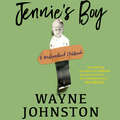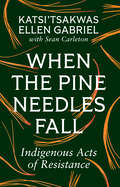Title search results
Showing 1 - 3 of 3 items

A two-spirit journey: the autobiography of a lesbian Ojibwa-Cree elder (Critical studies in Native history ; #18)
By Ma-Nee Chacaby, Mary Louisa Plummer. 2016
DAISY audio (Direct to player), DAISY audio (Zip)
Biography, Women biography, Indigenous peoples biography, Canadian biography, Canadian non-fiction, Canadian authors (Non-fiction)
Human-narrated audio
As a child, Chacaby learned spiritual and cultural traditions from her Cree grandmother and trapping, hunting, and bush survival skills…
from her Ojibwa stepfather. She also suffered physical and sexual abuse by different adults, and in her teen years became alcoholic herself. At twenty, Chacaby moved to Thunder Bay with her children to escape an abusive marriage. Abuse, compounded by racism, continued, but Chacaby found supports to help herself and others. Over the following decades, she achieved sobriety; trained and worked as an alcoholism counsellor; raised her children and fostered many others; learned to live with visual impairment; and came out as a lesbian. In 2013, Chacaby led the first gay pride parade in Thunder Bay. Ma-Nee Chacaby has emerged from hardship grounded in faith, compassion, humour, and resilience. Her memoir provides unprecedented insights into the challenges still faced by many Indigenous people. 2016.
Jennie's Boy: A Newfoundland Childhood
By Wayne Johnston. 2022
DAISY audio (Direct to player), DAISY audio (Zip)
General non-fiction, Literature biography, Journals and memoirs
Human-narrated audio
Consummate storyteller and bestselling novelist Wayne Johnston reaches back into his past to bring us a sad, tender and at…
times extremely funny memoir of his Newfoundland boyhood.For six months between 1966 and 1967, Wayne Johnston and his family lived in a wreck of a house across from his grandparents in Goulds, Newfoundland. At seven, Wayne was sickly and skinny, unable to keep food down, plagued with insomnia and a relentless cough that no doctor could diagnose, though they had already removed his tonsils, adenoids and appendix. To the neighbours, he was known as "Jennie’s boy," a backhanded salute to his tiny, ferocious mother, who felt judged for Wayne’s condition at the same time as worried he might never grow up. Unable to go to school, Wayne spent his days with his witty, religious, deeply eccentric maternal grandmother, Lucy. During these six months of Wayne’s childhood, he and Lucy faced two life-or-death crises, and only one of them lived to tell the tale. Jennie’s Boy is Wayne’s tribute to a family and a community that were simultaneously fiercely protective of him and fed up with having to make allowances for him. His boyhood was full of pain, yes, but also tenderness and Newfoundland wit. By that wit, and through love—often expressed in the most unloving ways—Wayne survived.
When the Pine Needles Fall: Indigenous Acts of Resistance
By Katsi’tsakwas Ellen Gabriel. 2024
Braille (Contracted), Electronic braille (Contracted), DAISY Audio (Direct to Player), DAISY Audio (Zip), DAISY text (Direct to player), DAISY text (Zip), Word (Zip), ePub (Zip)
Politics and government, General non-fiction
Synthetic audio, Automated braille
One of CBC Books Best Canadian Nonfiction Books of 2024 There have been many things written about Canada’s violent siege…
of Kanehsatà:ke and Kahnawà:ke in the summer of 1990, but When the Pine Needles Fall: Indigenous Acts of Resistance is the first book from the perspective of Katsi’tsakwas Ellen Gabriel, who was the Kanien’kehá:ka (Mohawk) spokesperson during the siege. When the Pine Needles Fall, written in a conversational style by Gabriel with historian Sean Carleton, offers an intimate look at Gabriel’s life leading up to the 1990 siege, her experiences as spokesperson for her community, and her work since then as an Indigenous land defender, human rights activist, and feminist leader. More than just the memoir of an extraordinary individual, When the Pine Needles Fall offers insight into Indigenous language, history, and philosophy, reflections on our relationship with the land, and calls to action against both colonialism and capitalism as we face the climate crisis. Gabriel’s hopes for a decolonial future make clear why protecting Indigenous homelands is vital not only for the survival of Indigenous peoples, but for all who live on this planet.